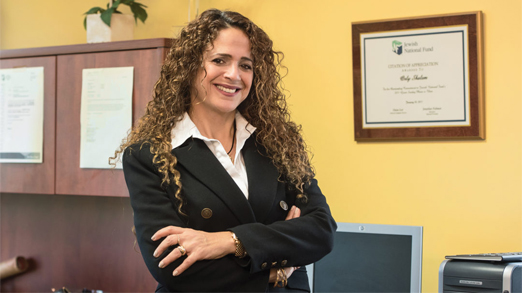Transformative Experience
The JNF’s new president has seen her organization revamp the Israeli landscape.

As the newly installed president of the Baltimore and Delaware region office of the Jewish National Fund, Orly Shalem says she is pleased to be both the first woman and first Israeli to hold that post.
Arguably best known for its iconic “blue boxes,” JNF oversees a range of social programs across the Jewish state.
For Shalem, who resides in Pikesville and attends the Chabad Israeli Center of Baltimore with her husband, Yair “Ron” Shalem, the challenge lies in getting out JNF’s message to a new generation of potential supporters and members.
Shalem, who will be installed on Dec. 8 at the next JNF board meeting, spoke with Jmore about what lies ahead.
How did you get involved in JNF?
About six years ago, I made a friend who knew I come from Beersheva. She immediately told me she was involved with JNF, and she told me about a project they have in my hometown.
The project is a river walk park. They took a place that I know that used to be a barren junkyard. It was empty, dirty, dry land. They made a vibrant, 1,300-acre, waterfront jewel in the Negev. That’s how they describe it, and I have seen it with my own eyes. It is amazing. It used to be a dirty, empty ground and now it is a beautiful area, surrounded by parks, amphitheaters, beautiful buildings.
That’s what drew my attention.
What are your priorities for the local JNF effort?
The first mission I went on with JNF was in March of 2016 in the south of Israel, close to Gaza. We visited places where the missiles have hit. We were able to see the kibbutzim that have gotten hurt. We met with teenagers, all these people who live very close to the Gaza border, and I could see how tough the life is there, to live under the threat of attack.
So I wonder what is it we can do to make their lives better, to help them feel secure again?
At JNF we support resilience centers. These are places where people can go who have psychological problems from hearing the missiles hitting, places where they get help for their problems. That’s one of the many projects JNF supports, and it’s a priority for me.
What other JNF projects are you excited about?
Community building is important to me. For instance, in Chalutza in the Negev desert. This town was founded in 2005. It was just a small group of people who were evacuated from their homes during the disengagement from Gaza. They didn’t know where to go. They were farmers and didn’t want to go to the city.
So they took this area of sand and today, after only 11 years, they have hundreds of families living there. JNF helped them do this, to make these acres of fields and beautiful new homes in a place where there was nothing but sand dunes.
What challenges does JNF face locally?
There are so many Jewish organizations, we all work for the same things: We all try to accomplish an ideal of a Jewish people living in Israel. We need people to feel that the work of JNF is just as important as these other things — not more important, but equally so.
There is so much JNF does for the land and for Israel. It’s not just planting trees. There is community building, heritage sites, disability and special needs, as well as forests and reforestation. We need people to understand the full extent of what JNF does.
How can you attract younger people to the cause?
JNF supports programs that send young people on free trips to Israel. This is very important. When they see Israel and what is going on there, then when they come back they are already halfway there. It’s not just a ‘story’ to them. It is something real.
Those trips build young leaders. Jewish education also helps. When young people are exposed to Jewish education, they start to take an interest in Jewish life, and that opens the door.
Story by Adam Stone
Photo by Harry Bosk
Publication: JMoreliving.com